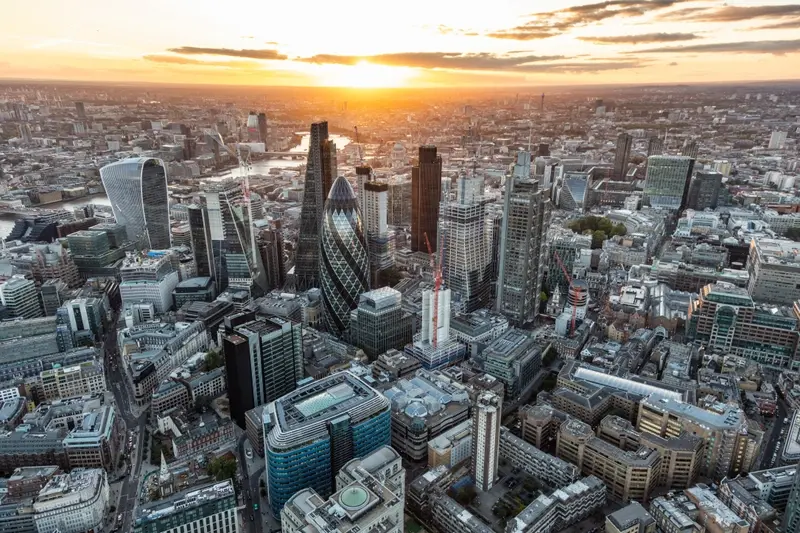
Stock prices were mixed in London on Tuesday at midday, although Asia-focused lenders HSBC and Standard Chartered helped the FTSE 100 outperform European peers, which continued to struggle on US interest rate fears and rising yields.
Also boosting the FTSE 100 were defensive shares, such as pharmaceuticals and consumer goods.
Elsewhere, boohoo slumped, after cutting revenue guidance.
The FTSE 100 index was up 13.74 points, or 0.2%, at 7,524.46. The FTSE 250 was down 91.68 points, or 0.5%, at 17,885.61 and the AIM All-Share lost 5.75 points, or 0.8%, at 711.89.
The Cboe UK 100 was up 0.2% at 750.43, the Cboe UK 250 fell 0.7% to 15,568.20, and the Cboe Small Companies was 0.6% higher at 13,462.91.
In European equities on Tuesday, the CAC 40 in Paris lost 0.4% and the DAX 40 in Frankfurt fell 0.3%.
Equities in mainland Europe struggled as investors price in a protracted period of higher US interest rates.
US treasury yields have also spiked, putting pressure on stocks.
‘Stubbornly high US government bond yields are making life harder for equities to press ahead. The US Treasury yield exceeded 4.7% overnight as investors took the view that the US economy is in a decent and resilient shape,’ AJ Bell analyst Russ Mould commented.
‘While a robust economy would be positive, it theoretically lowers the chances of the Federal Reserve making interest rate cuts in the near-term or at least fewer cuts than previously expected.’
Among the stocks sparing the FTSE 100 from the same fate as its European peers on Tuesday afternoon were those with a China exposure.
Asia focused lenders HSBC and Standard Chartered rose 2.4% and 1.4%, while insurer Prudential added 0.4%.
Shares in China Evergrande, a familiar name in Chinese property sector woe, resumed trading on Tuesday but to a positive response from investors. The stock closed up 28% in Hong Kong.
The company has become a symbol of China’s ballooning property crisis, which has seen several high-profile firms engulfed in a sea of debt, fuelling fears about the country’s wider economy and a possible global spillover.
Last Thursday, Evergrande said its founder and chairman Xu Jiayin was suspected of ‘illegal crimes’ after reports he was being held by police. The same day, the firm’s stocks were suspended in Hong Kong.
Defensive shares were also on the up in London. Pharmaceutical firms GSK and AstraZeneca added 1.2% and 0.8%, the latter announced it parted with $425 million to settle legal matters in the US. Consumer goods firms Unilever and Reckitt rose 0.9% and 0.5%.
Burberry fell 3.1%, sitting towards the bottom of the FTSE 100 index, after UBS cut the luxury goods firm to ’sell’.
Greggs also dropped 3.1% after trimming down its net store openings target, overshadowing an otherwise positive trading report.
Edison analyst Russell Pointon said: ‘Expanding its shop estate and investing in the supply chain further reinforce its market presence, albeit there may be some disappointment about the slightly lower than expected net new store growth for the full year, now targeting 135-145 stores versus 150 previously. While some economic uncertainties persist, Greggs’ consistent delivery of strong results, along with its reputation for customer satisfaction and affordability, bodes well for its future.’
The bakery chain said it got a boost from its evening trading, sales made after 1600, and its digital channels in the 13 weeks to September 30. Total sales rose 21% on-year during the period. Company-managed shop like-for-like sales were up 14%.
boohoo plunged 10% after slashing top-line guidance. The AIM listing posted a wider loss and revenue fall in its first-half, but believes it has a ‘clear path to improved profitability and getting back to growth’.
For the six months ended August 31, revenue fell 17% to £729.1 million from £882.4 million a year prior. The fast fashion firm’s pretax loss stretched to £26.4 million from £15.2 million.
Chief Executive John Lyttle said: ‘Over the first half, we have made substantial progress across key projects and initiatives, including the launch of our US distribution centre. We have seen significant improvements in sourcing lead times and invested in pricing to reinforce our value credentials. We have identified more than £125 million of annualised cost savings that support our investment programme. Our confidence in the medium-term prospects for the group remains unchanged as we execute on our key priorities where we see a clear path to improved profitability and getting back to growth.’
Looking to the full-year, boohoo now predicts its revenue will decline between 12% and 17% from £1.77 billion achieved the year prior. This is due to the ‘slower volume recovery than previously anticipated’ and the company plotting ‘more profitable sales within our labels’. Its previous revenue forecast ranged from a flat outcome to a 5% decline.
boohoo’s adjusted earnings before interest, tax, depreciation and amortisation margin is still expected to land between 4% and 4.5%. Its first-half adjusted Ebitda margin improved to 4.3% from 4.0% a year earlier.
Sterling was quoted at $1.2064 early Tuesday afternoon, lower than $1.2143 at the London equities close on Monday. The euro was changing hands at $1.0484, down from $1.0508. Against the yen, the dollar was quoted at JP¥149.87, up versus JP¥149.78.
Still to come on Tuesday is the latest US job openings and labour turnover survey at 1500 BST.
Ahead of the data, shares in the US are called slightly higher. The Dow Jones Industrial Average, the S&P 500 and the Nasdaq Composite are all called up 0.1%.
Gold was quoted at $1,826.60 an ounce early Tuesday afternoon, lower than $1,833.40 on Monday. Brent oil was trading at $90.16 a barrel, down from $90.70.
Copyright 2023 Alliance News Ltd. All Rights Reserved.




